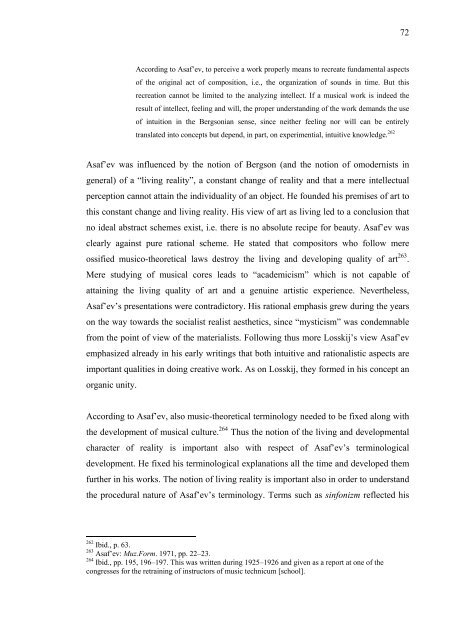Boris Asaf'ev and the Soviet Musicology - E-thesis
Boris Asaf'ev and the Soviet Musicology - E-thesis
Boris Asaf'ev and the Soviet Musicology - E-thesis
You also want an ePaper? Increase the reach of your titles
YUMPU automatically turns print PDFs into web optimized ePapers that Google loves.
According to Asaf’ev, to perceive a work properly means to recreate fundamental aspects<br />
of <strong>the</strong> original act of composition, i.e., <strong>the</strong> organization of sounds in time. But this<br />
recreation cannot be limited to <strong>the</strong> analyzing intellect. If a musical work is indeed <strong>the</strong><br />
result of intellect, feeling <strong>and</strong> will, <strong>the</strong> proper underst<strong>and</strong>ing of <strong>the</strong> work dem<strong>and</strong>s <strong>the</strong> use<br />
of intuition in <strong>the</strong> Bergsonian sense, since nei<strong>the</strong>r feeling nor will can be entirely<br />
translated into concepts but depend, in part, on experimential, intuitive knowledge. 262<br />
Asaf’ev was influenced by <strong>the</strong> notion of Bergson (<strong>and</strong> <strong>the</strong> notion of omodernists in<br />
general) of a “living reality”, a constant change of reality <strong>and</strong> that a mere intellectual<br />
perception cannot attain <strong>the</strong> individuality of an object. He founded his premises of art to<br />
this constant change <strong>and</strong> living reality. His view of art as living led to a conclusion that<br />
no ideal abstract schemes exist, i.e. <strong>the</strong>re is no absolute recipe for beauty. Asaf’ev was<br />
clearly against pure rational scheme. He stated that compositors who follow mere<br />
ossified musico-<strong>the</strong>oretical laws destroy <strong>the</strong> living <strong>and</strong> developing quality of art 263 .<br />
Mere studying of musical cores leads to “academicism” which is not capable of<br />
attaining <strong>the</strong> living quality of art <strong>and</strong> a genuine artistic experience. Never<strong>the</strong>less,<br />
Asaf’ev’s presentations were contradictory. His rational emphasis grew during <strong>the</strong> years<br />
on <strong>the</strong> way towards <strong>the</strong> socialist realist aes<strong>the</strong>tics, since “mysticism” was condemnable<br />
from <strong>the</strong> point of view of <strong>the</strong> materialists. Following thus more Losskij’s view Asaf’ev<br />
emphasized already in his early writings that both intuitive <strong>and</strong> rationalistic aspects are<br />
important qualities in doing creative work. As on Losskij, <strong>the</strong>y formed in his concept an<br />
organic unity.<br />
According to Asaf’ev, also music-<strong>the</strong>oretical terminology needed to be fixed along with<br />
<strong>the</strong> development of musical culture. 264 Thus <strong>the</strong> notion of <strong>the</strong> living <strong>and</strong> developmental<br />
character of reality is important also with respect of Asaf’ev’s terminological<br />
development. He fixed his terminological explanations all <strong>the</strong> time <strong>and</strong> developed <strong>the</strong>m<br />
fur<strong>the</strong>r in his works. The notion of living reality is important also in order to underst<strong>and</strong><br />
<strong>the</strong> procedural nature of Asaf’ev’s terminology. Terms such as sinfonizm reflected his<br />
262 Ibid., p. 63.<br />
263 Asaf’ev: Muz.Form. 1971, pp. 22–23.<br />
264 Ibid., pp. 195, 196–197. This was written during 1925–1926 <strong>and</strong> given as a report at one of <strong>the</strong><br />
congresses for <strong>the</strong> retraining of instructors of music technicum [school].<br />
72

















